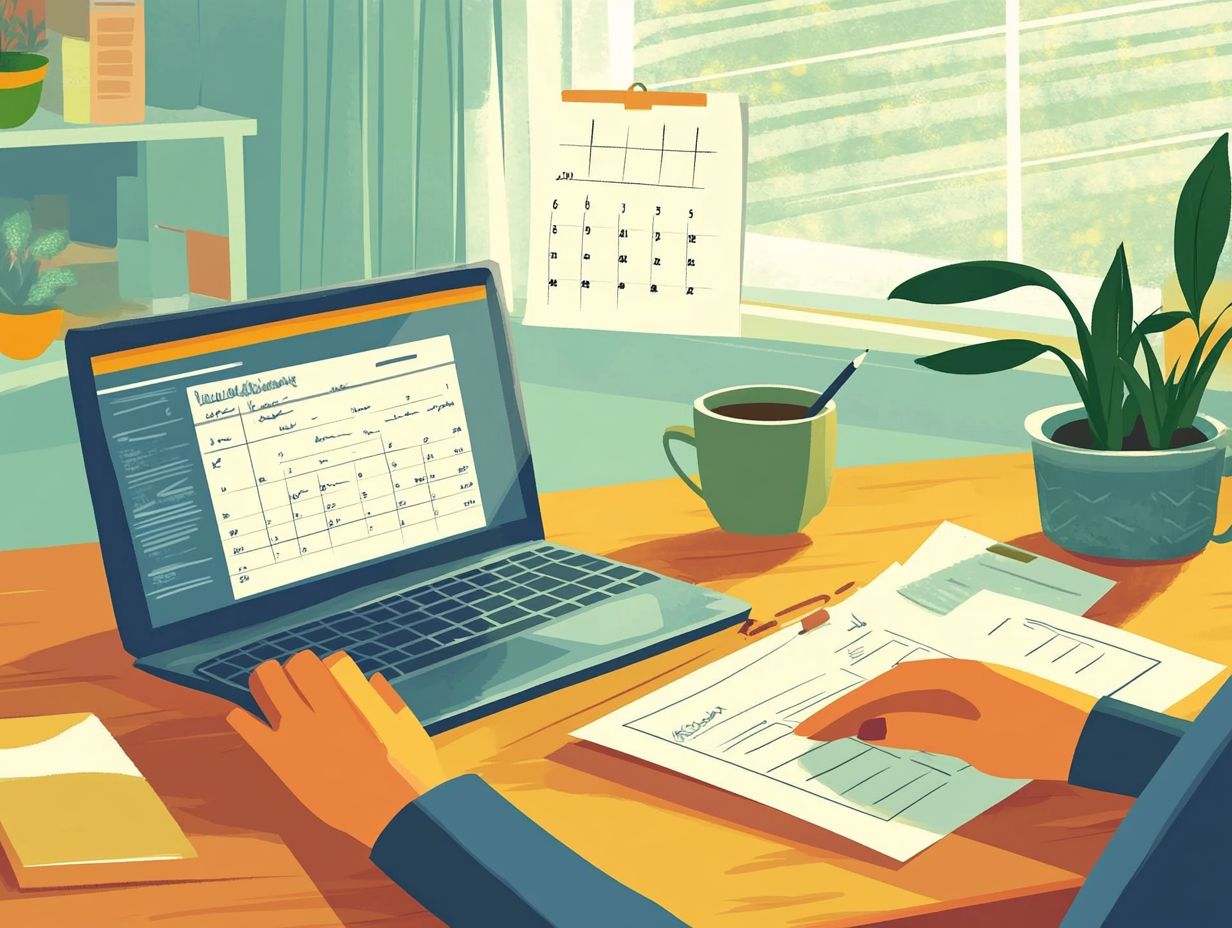How to Cancel Your Home Insurance Policy?
Home insurance safeguards your property and belongings. However, you may need to cancel your policy at some point.
Whether you re moving, switching providers, or reassessing your coverage, understanding how to cancel is crucial. This article will help you explore the reasons for canceling, the necessary steps, and important factors to consider.
By the end, you ll be ready to make an informed decision about your options.
Contents
- Key Takeaways:
- Understanding Home Insurance Cancellation
- Reasons for Cancelling Home Insurance
- Steps to Cancel Your Home Insurance Policy
- Considerations Before Cancelling
- Finalizing the Cancellation
- Frequently Asked Questions
- How do I cancel my home insurance policy?
- Is there a fee for cancelling my home insurance policy?
- Can I cancel my home insurance policy at any time?
- Will I receive a refund if I cancel my home insurance policy?
- Do I need to provide a reason for cancelling my home insurance policy?
- What Should I Do with My Policy Documents After I Cancel My Home Insurance Policy?
Key Takeaways:

Understand home insurance cancellation and its necessity.
Follow the steps to cancel your policy, including reviewing coverage, contacting your provider, and providing necessary documents.
Consider alternatives and implications before cancellation to ensure the best decision for your situation.
Understanding Home Insurance Cancellation
Understanding the details of home insurance cancellation is essential for homeowners. It affects your financial security and access to vital coverage.
Cancellations can happen for various reasons, such as missed payments or policy violations. It’s important to know why these cancellations occur to protect your interests and explore alternatives.
Being well-informed about cancellation requirements allows you to make smart financial decisions regarding your home insurance policies.
What is Home Insurance Cancellation?
Home insurance cancellation means ending your homeowner insurance policy. This can be initiated by either you or your insurance provider, impacting your financial stability and asset protection.
Cancellation scenarios fall into two categories: voluntary and involuntary. Voluntary cancellations happen when you choose to end your policy, while involuntary cancellations are typically driven by the insurer.
Non-payment, risk assessment issues, or not following policy terms often lead to involuntary cancellations. It s crucial to understand the legal implications of these cancellations to avoid coverage gaps.
Reasons for Cancelling Home Insurance
Several reasons might lead you to cancel your home insurance. These include rising premiums, changes in your financial situation, or evolving coverage needs.
Common Reasons for Cancellation
Common reasons include receiving a nonrenewal notice, increasing premiums, and being considered a high-risk homeowner. Understanding these factors is vital as they can significantly affect your coverage and financial health.
For example, getting a nonrenewal notice can leave you scrambling to secure new coverage. Meanwhile, rising premiums may stretch your budget, leading you to consider dropping your policy altogether.
If you reside in a high-risk area, finding affordable rates becomes challenging. Insurers typically communicate cancellations through formal letters; however, many homeowners may not fully understand the implications or steps to take.
This highlights the need for proactive insurance management to protect your home and finances.
Steps to Cancel Your Home Insurance Policy

Cancelling your home insurance policy entails a well-defined set of steps designed to ensure compliance with insurance regulations while safeguarding your rights as a policyholder. This process helps you make informed financial decisions. It guides you smoothly through the transition.
Reviewing Your Policy and Coverage
Before canceling your home insurance, review your current policy and coverage options. This helps you understand what is included and what might need changes.
Assess your coverage limits, the amount you pay out of pocket before insurance kicks in, and specific policy terms. This will enable you to make more informed choices.
Reviewing your coverage can reveal opportunities to adjust your policy, whether it’s increasing coverage for your valuables or reconsidering deductibles that better align with your financial situation.
Exploring various options could lead to premium savings or enhanced protections tailored specifically to your needs, ultimately ensuring you have peace of mind in your insurance decisions.
Contacting Your Insurance Provider
Act quickly to discuss your cancellation this will help ensure a smooth transition! Reaching out to your insurance provider is a pivotal step in the cancellation process. It allows you to formally express your intention to cancel while gaining insight into the necessary steps and potential implications under existing regulations.
When you contact the provider, have your policy number ready, along with your reasons for cancellation. This preparation helps facilitate a smooth conversation.
Don t hesitate to ask specific questions, like whether there are any cancellation fees or how long it will take for your policy to officially conclude. Insurance agents are invaluable in this process; they can provide clarity on any policies that may better suit your needs, as well as detail the timeline and paperwork involved in canceling your current insurance.
By tapping into their expertise, you can navigate the complexities of cancellation more adeptly and steer clear of any unexpected hurdles.
Providing Required Documentation
Providing the required documentation is vital in the cancellation process. This ensures that your insurance provider has all the necessary information to handle your home insurance cancellation efficiently and in alignment with your rights as a policyholder.
This usually entails submitting a written cancellation request, which formally informs the insurer of your decision to cancel. This request clearly articulates your intent and serves as an official record for both you and the insurer.
Proof of alternate coverage is essential; it reassures the insurer that you won’t be left uninsured during the transition. Other supporting documents may include any pertinent correspondence or a copy of your policy, which can further clarify the specifics of your coverage.
Having these documents on hand can significantly streamline the process, minimizing the chances of delays or misunderstandings.
Considerations Before Cancelling
Before canceling your home insurance, consider key factors that might affect your coverage and finances! This way, you can ensure that you’re not leaving yourself exposed in the insurance market.
Alternative Options and Implications

Exploring alternative insurance coverage options is essential for you as a homeowner, particularly if you re in a high-risk situation. This step can help protect you from unexpected financial issues and ensure you re covered against unforeseen events after cancelling your existing policy.
There s a variety of home insurance policies tailored to meet different needs. You might consider standard policies, like the HO-3 for broad coverage, or specialty options such as the DP-1 for rental properties.
If you reside in high-risk areas prone to flooding or wildfires, specialized coverage like flood or fire insurance may be necessary to address the gaps left by standard policies.
Each alternative comes with its own cost implications, coverage limits, and how to file a claim processes that could significantly shape your overall experience. For instance, while specialized coverage might offer enhanced protection, it often carries a higher premium.
You ll need to weigh the trade-offs between affordability and the peace of mind that comes with being prepared for the unexpected.
Finalizing the Cancellation
Finalizing the cancellation of your home insurance policy requires careful attention to detail. It s crucial that you complete all necessary steps and secure confirmation of the cancellation from your insurance provider.
This not only safeguards your rights as a policyholder but also ensures you re positioned to receive any potential refunds.
Confirming Cancellation and Refunds
Confirm your cancellation and understand the refund process. This helps you stay protected and make smart financial choices.
Don t wait! Contact your insurance provider directly, whether by phone or through their online portal. This interaction secures your confirmation number and sheds light on any potential fees or penalties that may apply.
Typically, the refund process can take anywhere from a few days to several weeks, depending on your insurer’s policies. Understanding these timelines is crucial, as they could significantly impact your cash flow especially if you were relying on that refund to meet other financial obligations.
Therefore, taking the time to review your policy for any cancellation clauses can help you avoid unforeseen financial pitfalls.
Frequently Asked Questions
How do I cancel my home insurance policy?
To cancel your home insurance policy, you will need to contact your insurance provider directly. Most companies allow you to cancel your policy by phone, email, or through their online portal. For detailed steps, check out this guide on how to cancel your home insurance policy. Be sure to have your policy number and personal information available when you contact them.
Is there a fee for cancelling my home insurance policy?

This will depend on your insurance provider and the terms of your policy. Some companies may charge a cancellation fee, while others do not. It’s important to review your policy or contact your provider to understand any potential fees that may apply.
Can I cancel my home insurance policy at any time?
In most cases, yes, you can cancel your home insurance policy at any time. However, there may be certain restrictions or penalties for cancelling mid-policy. It’s best to review your policy or speak with your insurance provider to understand any potential consequences.
Will I receive a refund if I cancel my home insurance policy?
This will depend on the terms of your policy and the timing of your cancellation. If you cancel your policy before it expires, you may receive a partial refund for the remaining time left on your policy. However, if you cancel after the expiration, no refund will be issued.
Do I need to provide a reason for cancelling my home insurance policy?
No, you do not need to provide a reason for cancelling your home insurance policy. However, your insurance provider may ask for feedback or if there is anything they can do to retain your business. You are not obligated to provide a reason or change your decision.
What Should I Do with My Policy Documents After I Cancel My Home Insurance Policy?
After you cancel your home insurance policy, keep the documents for your records. You might need them later to show proof of previous coverage to a new provider.
Don’t forget to confirm that your policy has been officially cancelled with your insurance provider!
Take a moment now to store those important documents safely!




